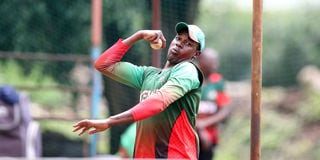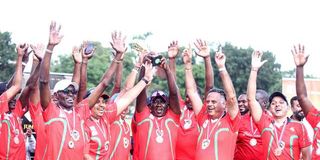Premium
The last of Obuya's cricket trilogy calls time on his decorated career

Kenya bowler Collins Obuya trains at Ruaraka Sports Club on November 17, 2023 ahead of the 2024 International Cricket Council (ICC) Men’s T20 World Cup Africa qualifiers set for November 22 to 30 in Namibia.
What you need to know:
- Collins shot to fame at the 2003 Cricket World Cup, co-hosted by South Africa, Zimbabwe and Kenya
- A strong sense of personal discipline, the all-rounder says, has had a huge impact on his longevity in cricket
- He has played club cricket in the United Kingdom, Australia, South Africa and Uganda
Whenever Kenya's Collins Obuya plays cricket, his performances remind fans why he is one of the country's finest exponents of the game.
And it is easy to see why.
An all-rounder, the 42-year-old bats right-handed and bowls leg spin. He shot to fame at the 2003 Cricket World Cup, co-hosted by South Africa, Zimbabwe and Kenya. Collins was one of Kenya's best performers in the tournament, helping the country reach the historic semi-finals for the first time.
His retirement from the national team last month closed a rosy chapter in Kenyan cricket as he was the last member of the legendary team, still playing competitive cricket.
Now, as then, he displays flashes of brilliance that made him one of the most revered all-rounders in the world.
After 23 years in the game, the 42-year-old called time on a decorated career that has seen him play 568 times for Kenya.
He has played club cricket in the United Kingdom, Australia, South Africa and Uganda.

Kenyan cricketer Collins Obuya takes photographs during a training session at The Suriyawewa Mahinda Rajapakse International Cricket Stadium in the southern district of Hambantota on February 22,2011.
Yet when his elder brothers Kennedy and David introduced him to the sport in the ‘90s, he did not envisage himself playing for that long.
“I consider it a miracle that I have played for this long,” the all-rounder tells Nation Sport.
“I’m very grateful for that, and I thank God for keeping me fit all this long.”
The father of two now joins a long list of players who frequented the ICC Cricket World Cup when Kenya was a force to reckon with in the game but watched helplessly in recent years as the standards of the game deteriorated.
In an enthralling bronze medal match between Kenya and Uganda at the 13th African Games in Accra on March 23, Collins had a deep conviction that it was time he bowed out of international duty while still at the top.
Yet, it wasn't meant to end this way.
“Heading to Ghana, I had no plans to retire from the game but at some point (in the match between Kenya and Uganda), I felt that my body was struggling,” says the right-hand batsman and leg-spinner, who was still Kenya’s best player by a mile.
“I felt that it was time for me to retire.”
He smashed three half-centuries in the African Games – 58 runs off 47 balls against South Africa - and 68 runs off 30 balls against Ghana in the group stage.
In the semi-finals against Zimbabwe, he posted 52 runs off 29 balls. Taking to the crease for his last innings as a batsman for Kenya, the veteran cricketer had hoped to give his fans a treat of his blazing boundaries and towering sixes one more time.
It didn’t happen.
Weighed down by age and tiring feet, the 42-year-old bowled out before getting any run. In cricket terms, Collins was dismissed for a duck, and Uganda beat Kenya by 106 runs.
But with several achievements to his name, that was not how he had planned to retire from the sport he loved.

Kenya's Collins Obuya plays a delivery during their Continent Cup Twenty20 International (T20I) Africa competition match against Uganda on June 10, 2023 at Nairobi Gymkhana Ground.
Yet even a disastrous last innings of his international career wasn’t stopping him from popping the champagne on his national team retirement.
The guard of honour mounted by Kenya and Uganda players at the end of the match and a long applause from the spectators signalled that his remarkable career with the national team is one for the history books.
“I’m very proud of my performance,” the former Kenya captain said.
“I played for Kenya in the Under-19 ICC World Cup (1998 and 2000), the T20 World Cup (2007) and two editions of the One-Day International World Cup (2003 and 2011). I’m very grateful for that and I wish to thank everyone who supported me. I thank God for enabling me to play that long.”
The dangerous opening batsman still wants to play for his family’s team, Obuya Cricket Academy, for two more years, after which he will transition to coaching.
The secret to his longevity in the game?
“The love and passion I have for cricket is what has kept me going for this long,” he says. “But those who know me well will tell you that I’m one person who trains very hard. Every morning, I hit the gym for about an hour, after which I bat, bowl, and field with the help of my coach. After all that, I joined my teammates in training. At home, I ensure that I eat well and have enough rest and sleep,” adds the player-cum-coach, stressing that he is a teetotaller.
A strong sense of personal discipline, the all-rounder says, has had a huge impact on his longevity in cricket.
“I have played under many coaches, who were also my teammates in the national team. I don’t think that would have been possible if I were not disciplined. Despite being people whom I played cricket with, I never disrespected them when they became my coaches,” says the towering cricketer.

Red team captain Steve Tikolo leads his retired international mates in celebrations after beating Green by 6 wickets in the Kenya Legends T-20 festive fixture at Sikh Union ground, Nairobi on January 7, 2024.
The players he played with and ended up being his coaches in the national team are Thomas Odoyo, Steve Tikolo, his elder brother David, Martin Suji, current coach Lameck Onyango, and assistant coaches Peter Ong’ondo and Joseph Angara.
What was it like for him to play in a team coached by his brother David?
“The working relationship was good. I respected him as my coach, and he respected me in return as his player. Anytime I cost the team, he openly called me out,” says Collins.
Had Kennedy and David not introduced him to cricket, he would have tried his luck in football.
“I loved playing football in the estate. I had no specific position, but I had great potential,” offers the leg-spinner.
Kennedy and David learnt cricket at the Aga Khan Sports Club in Nairobi, located just a few yards from where their family lived.

In this undated file photo, cricket players Kennedy Obuya (left) and Jimmy Kamande relax after a training session at Aga Khan Sports Centre.
Since Aga Khan Sports Club paid school fees for its players from humble backgrounds, Collins says their parents always encouraged them to take the sport seriously. Playing as a bowler, he became an integral part of the club’s cricket team. It was not long before his continued top performance for the club started taking him places.
He was part of the squad that represented Kenya in the 1998 and 2000 editions of the ICC Under-19 Men’s World Cup (ODI) held in South Africa and Sri Lanka (50 overs), respectively.
After making his senior debut for Kenya in 2001 against West Indies in an ODI match at the Sikh Union Club in Nairobi, the right-hand batsman represented the country in most subsequent tournaments.
Had he been faint-hearted, he would have called time on his cricket career ages ago.
While Collins’ top performance in the 2003 World Cup earned him a one-year contract with English countryside Warwickshire, he failed to make any impression at the club.
At Warwickshire, things became tougher for Collins when he was sidelined for five months with a knee injury. When he resumed playing, he continued to struggle with his bowling. Not even specialised training in Australia in 2005 under the legendary cricketer Terry Jenner helped things.
But since old habits die hard, Collins never gave up on reviving his cricket career.
He elected to turn all his attention to perfecting his batting, and his star began to shine again. When Collins called time on his international career in Accra, he was still Kenya’s top batsman.
“There is no trick to it (his top batting). I just spend time on training, read the opposition’s game, and adjust accordingly,” he says of his impressive batting throughout the years.
He says being part of the revered Kenyan team in the 2003 World Cup and the experience he has gained from playing with different players in different generations have also been crucial to his top performance at an advanced age.
“Maurice Odumbe would share with me tips on how to be a top bowler,” he says of Kenya’s most talented cricketer who became his role model.
“Kennedy shared with me the tricks to apply to stay long on the crease and score big runs,” the former national team captain says.
“He (Odumbe) could bat, bowl, and spin so well. That motivated me to work hard and be like him. He helped me a lot with my spin bowling,” he recalls.
Collins pays tribute to his family, especially his wife Rachel, for supporting his career. “They have been supporting me in good and bad times. When I got the injury, they were there for me, they supported me to get back,” says the former Stray Lions Cricket Club, Sikh Union Club, and Ruaraka Cricket Club player.
“I want to thank her (Rachel) for being there for me and the family whenever I was not around. She was taking care of the kids, I thank and appreciate her in a big way,” added Collins, who also played for Weymouth Cricket Club (UK), Pirates Cricket Club (South Africa), Caboolture Cricket Club (Australia), Ceylon Lions Cricket Club and Tornado Bees Cricket Club in Uganda.

Kenya national cricket team spin bowler Collins Obuya (left) with his wife Rachel Musyoka during their wedding ceremony at the Hodari grounds in Nairobi on June 18, 2011.
Until July last year, Collins still harboured the dream of playing in the prestigious India Premier League. But following his retirement from international duty, he has given up on that dream and hopes to achieve it through his 16-year-old son Troy.
“I will try and convince him to work hard and achieve that dream. He is coming up nicely,” says Collins. He has also introduced his young daughter Alma to cricket and wants to see her don the national team colours in future.
He plans to pursue ICC Coaching Course Level III Cricket Certification.
“I’m waiting for the opportunity to come up for me to improve my coaching career. I hope to coach different teams at different levels,” Collins, who has already undertaken Level I and II of the ICC coaching certifications, says.
“I not only want to coach them (Kenya) but I also want to take the team to the World Cup.”
With more time on his hands, he has also started playing golf for fun. Outside cricket, Collins loves reading books, swimming, and making friends.





